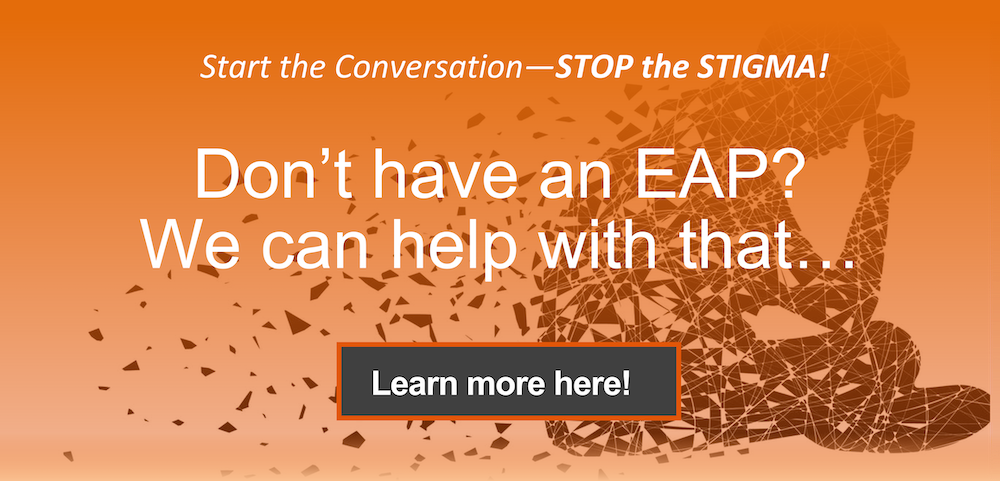We live in a culture that rewards composure.
From an early age, many of us learn to keep our emotions in check, to stay positive, and to push through challenges without complaint. While there’s value in resilience, there’s also a cost to constantly pretending everything is fine—especially when it’s not.
Stigma is part of the problem. A 2024 article from the National Council on Aging notes that lingering stereotypes around mental illness often lead to shame and silence. Many people worry they’ll be judged, dismissed, or even penalized for admitting they’re struggling.
And it’s not just external pressure. Self-stigma plays a powerful role too. We internalize the idea that asking for help means we’ve failed in some way. That needing support is something to be embarrassed about. These beliefs are deeply ingrained, and they don’t disappear just because we know better.
But ignoring emotional distress doesn’t make it go away. It just pushes it deeper, where it can quietly affect everything from our physical health to our relationships.
The Power of Naming and Validating Emotions
There’s a kind of quiet power in being able to say, “This is what I’m feeling.”
Not because it fixes everything, but because it creates a small space between you and the emotion itself. That space can be enough to interrupt the spiral of worry, shame, or self-criticism that often follows difficult feelings.
According to a UCLA study led by psychologist Matthew Lieberman, naming your emotions—what researchers call "affect labeling"—can reduce activity in the amygdala, the part of the brain that governs fear and distress. Simply identifying a feeling like anger or anxiety can begin to regulate it.
But naming alone isn’t enough. To truly support mental health, we also need to validate what we’re feeling. That means resisting the urge to talk ourselves out of emotions with phrases like “Other people have it worse” or “I should be over this by now.” These kinds of self-dismissals may feel logical, but they often reinforce the idea that emotions are problems to be solved rather than signals to be understood.
Validation doesn’t require agreement. It doesn’t mean the situation is fair or that the feeling is pleasant. It just means you’re acknowledging what is true in the moment. That you’re tired. Or hurt. Or scared. And that those feelings are allowed.
In an article for Harvard Business Review, executive coach Rebecca Newton points out that naming your pain isn’t weakness, it’s the first step toward self-awareness and connection. And that’s what most of us are really after. Not to be fixed, but to be seen.
Seeking Support Is a Strength, Not a Deficit
One of the most damaging myths about mental health is the idea that strong people don’t need help.
That mindset has kept far too many people silent, especially when they needed support the most. It’s easy to think that asking for help means you’re failing, or that struggling is something to be ashamed of. But the truth is, reaching out takes far more courage than pretending you have it all together.
The National Alliance on Mental Illness found in its 2024 Workplace Mental Health Poll that more than one-third of U.S. employees feel uncomfortable talking about their mental health at work. And while this survey focused on workplaces, the underlying issue applies everywhere: people fear that opening up will lead to judgment or consequences.
But change is happening, albeit slowly and not always evenly. The broader cultural conversation around therapy, emotional honesty, and mutual support is shifting. What once might have been kept quiet is now more openly discussed, even celebrated. Social media, public figures, and grassroots campaigns have helped normalize the idea that mental health is just health.
Still, normalization isn’t the same as action. Each of us has to take the step of actually using the support systems available to us, whether that’s a trusted friend, a support group, or a licensed professional.
Asking for help doesn’t mean something is wrong with you. It means you recognize your humanity and you're willing to care for it.
From Awareness to Action: What You Can Do
Recognizing that you're not okay is important. But what happens next? Taking action doesn’t always mean major life changes; it often means learning to respond to yourself with more honesty, compassion, and care.
5 Techniques for Personal Reflection
1. CHECK IN with yourself—And Actually Listen
Many of us go through the day with a vague sense that something’s off, but we rarely pause long enough to ask what’s behind it. A check-in isn’t just a moment to ask “How am I doing?” It’s an opportunity to notice how stress, sadness, or anxiety might be showing up in your body, your behavior, or your thoughts.
Start simply by asking:
- Am I sleeping more or less than usual?
- Have I lost interest in things I usually enjoy?
- Am I constantly tired, irritated, or on edge?
These are not signs of failure. They’re signals that your body and mind are trying to get your attention. Making space to notice them, even briefly, can help you move out of autopilot and into awareness. Over time, you may start to notice patterns or triggers, which gives you more choices in how you respond.
2. limit what drains you
When you're overwhelmed, your nervous system can’t tell the difference between a crisis and a crowded calendar. The result is constant depletion.
Limiting what drains you doesn’t mean avoiding your responsibilities. It means becoming more discerning about what’s necessary and what’s simply expected. That might mean:
- Turning off news alerts after a certain hour
- Taking a break from social media, especially if it leaves you feeling inadequate or anxious
- Saying “no” to things you used to say “yes” to automatically
Boundaries are not selfish. They’re what allow us to show up with energy and intention. When you're running on empty, subtraction is often more powerful than addition.
3. reach out before things hit a crisis point
We often wait until we’re completely unraveling before we ask for help. But you don’t have to be in crisis to deserve support. In fact, the earlier you reach out, the more likely you are to find clarity and relief before things spiral.
If opening up feels hard, start small. You might text someone, “Can we talk later? I’m having a tough day.” Or say to a friend, “I don’t need advice, but I could really use someone to listen.” These kinds of low-pressure conversations can interrupt the isolation that often fuels emotional pain.
You also don’t need to wait until you’ve hit a wall to seek professional support. Therapy is just as useful for prevention as it is for recovery. If you’re not sure where to begin, check with your company’s employee assistance program or the National Alliance on Mental Illness' helpline and resource locator.
4. move—Even a Little
When your mind feels stuck, your body can lead the way out.
You don’t need to “work out” to experience the mental health benefits of movement. A 10-minute walk, especially outdoors, can reduce stress hormones and increase feelings of well-being. Stretching before bed can quiet racing thoughts. Dancing around your kitchen (yes, even badly) can interrupt spirals of negative thinking.
This isn’t about chasing productivity or burning calories. It’s about reconnecting with your physical self, which can be an anchor when your emotional world feels unsteady.
5. do one thing that grounds you
Sometimes the most important thing you can do is something that reminds you of who you are outside of your stress or sadness.
This might mean:
- Listening to music that makes you feel understood
- Cooking a familiar meal that reminds you of home
- Sitting in nature, even for a few minutes
- Returning to a creative hobby like drawing, singing, or playing an instrument
- Rewatching a favorite movie—not for distraction, but for comfort
These rituals may not “fix” anything, but they can help you feel more real, more connected, more alive. And that matters more than it may seem.
Creating Space for Honesty—At Work and Beyond
Even as conversations about mental health become more common, many people still feel pressure to keep up appearances in professional settings. The fear of being seen as less capable, less reliable, or somehow “too emotional” keeps many employees quiet even when they’re struggling.
This is especially concerning because, for many people, the workplace is where they spend the majority of their waking hours. If we’re expected to leave our feelings at the door, that’s a lot of life to hide.
According to the American Psychological Association, psychological safety at work—the belief that it’s safe to take interpersonal risks without fear of embarrassment or punishment—is closely tied to well-being and productivity. When people feel they can be honest about how they’re doing, they’re more likely to engage meaningfully, collaborate openly, and recover from setbacks.
On the other hand, persistent anxiety can have a significant impact on an individual’s mental and physical health, as well as their ability to perform in the workplace.
Creating that kind of environment doesn’t require dramatic changes. It starts with small moments:
- A manager who models vulnerability by acknowledging their own stress
- A coworker who checks in after a tough meeting
- A team that respects personal boundaries and honors time off
While not every workplace is there yet, we all have the ability to contribute to a culture that values honesty over performance. Whether you’re leading a team or working alongside one, your willingness to be human gives others permission to do the same.
And the impact of that on morale, trust, and long-term health can’t be overstated.
It's Not a Failure to Feel
The truth is, everyone struggles. But not everyone feels safe enough to say so. By naming what we feel, asking for help when we need it, and creating space for honesty in ourselves and in others, we make it easier to move through hard moments with clarity instead of shame.
When you partner with Ulliance, our Life Advisor Consultants are always just a phone call away to teach ways to enhance your work/life balance and increase your happiness. The Ulliance Life Advisor Employee Assistance Program can help employees and employers come closer to a state of total well-being.
Investing in the right EAP or Wellness Program to support your employees will help them and help you. Visit https://ulliance.com/ or call 866-648-8326.
The Ulliance Employee Assistance Program can address the
following issues:
• Stress about work or job performance
• Crisis in the workplace
• Conflict resolution at work or in one’s personal life
• Marital or relationship problems
• Child or elder care concerns
• Financial worries
• Mental health problems
• Alcohol/substance abuse
• Grief
• Interpersonal conflicts
• AND MORE!
References:
It’s OK to Not Be OK; Harvard Business Review; Rebecca Newton
https://hbr.org/2020/11/its-okay-to-not-be-okay
Mental Health Stigma: Changing the Conversation; National Council on Aging
https://www.ncoa.org/article/mental-health-stigma-changing-the-conversation
Putting Feelings Into Words Produces Therapeutic Effects in the Brain; UCLA Newsroom
https://newsroom.ucla.edu/releases/Putting-Feelings-Into-Words-Produces-8047
Work in America 2024: Psychological Safety; American Psychological Association
https://www.apa.org/pubs/reports/work-in-america/2024/psychological-safety
HelpLine and Support Locator; National Alliance on Mental Illness (NAMI)
https://www.nami.org/help



